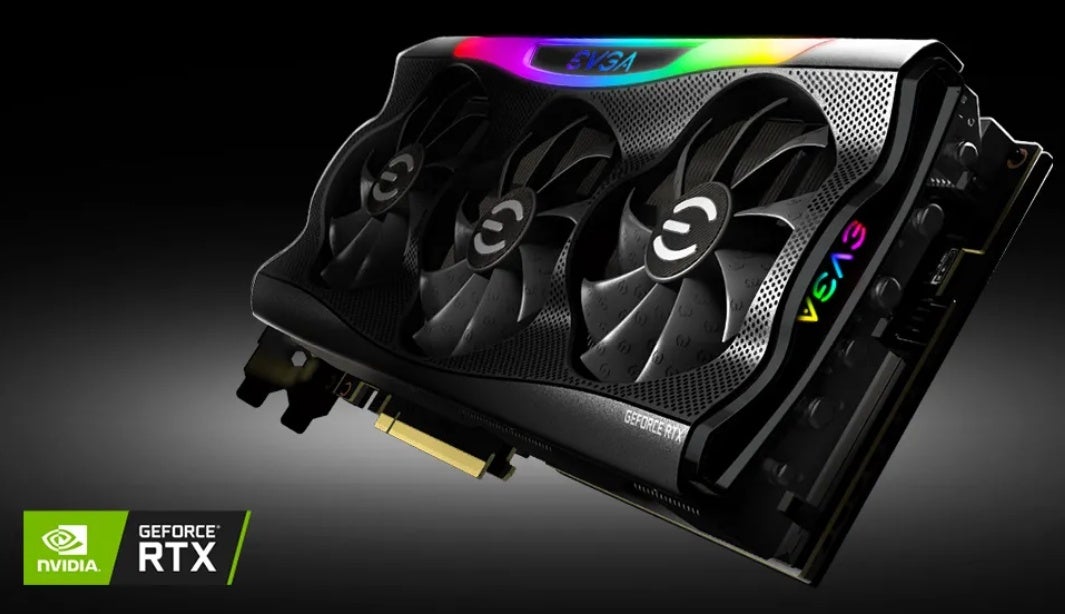PC graphics card manufacturer EVGA has announced that it will terminate making all GPU hardware at the end of this current hardware generation, following a large-scale falling out with GPU tech titan Nvidia.
In a move that is likely to have significant repercussions across the PC gaming hardware industry, EVGA isn’t just dropping Nvidia – it also has no plans to move into creating GPUs with either AMD or Intel, Nvidia’s two key rivals. The company, which is well-known for making high-quality cards at reasonable prices, will instead quit the GPU business entirely.
The news was delivered today by a small number of hardware specialist media in various detailed reports, the best of which can be found over at the brilliant GamersNexus on YouTube (and embedded below). These outlets were directly briefed by EVGA, which confirmed that despite building prototype and test cards based on Nvidia’s upcoming 40-series GPUs, it wouldn’t be proceeding with those products – or any further Nvidia products.
The statement was confirmed on the official website, but only in a short forum post from an EVGA Product Manager. “EVGA will not carry the next generation graphics cards,” the statement offers, before reiterating support for current generation products will continue.
The falling out appears to primarily be about money, of course, with EVGA’s main complaint being that Nvidia is allegedly under-cutting third-party cards with its own ‘Founders Edition’ cards. Because Nvidia makes those GPUs and essentially cuts out the ‘middle man’ of third-party manufacturers such as EVGA, Gigabyte, or Asus, it can charge less – and as a result, obtain a market position that puts other manufacturers in an impossible situation. The claim is that in many cases it is impossible for EVGA to actually sell certain 30-series GPU models at a profit, such is the size of the undercut Nvidia is able to perform with its in-house cards.
Talking to GamersNexus, EVGA CEO Andrew Han described the decision as a matter of principle rather than strictly about financials – going on to elaborate with claims that communication and treatment from Nvidia towards its partners had been poor.
For EVGA, this is a major decision. Though EVGA makes other products including Power Supplies, GamersNexus reports that over 70% of the company’s revenue comes from its GPU department – a market that the business now seeks to leave entirely. This also might be painful for Nvidia, as EVGA represents a significant percentage of Nvidia GPU sales worldwide – but that gap may simply be filled by other partners.
For whatever reason, EVGA isn’t interested in engineering GPUs with AMD or Intel technology – and so it is stepping away. Despite this, and despite how many staff will no longer have relevant skills to the brand, top-level EVGA executives say they have no intention to make staff cuts.
All of this comes at a particularly interesting and difficult time in the PC hardware market, especially around GPUs. Over the last couple of years and throughout the pandemic GPU demand rocketed thanks to a combination of demand for gaming hardware and the crypto craze. This led to soaring prices and low availability – which caused GPU manufacturers to up their game and boost their output. Then, predictably, the bottom fell out.
As cryptocurrency values slid, miners sold off their old cards and demand slumped – which led to many hardware companies taking a bath, left sitting on huge excess inventory. A shortage turned into a surplus practically overnight. Nvidia ended up missing its revenue projections by a huge amount. This is the position we’re in now, on the cusp of a new generation in the form of the 40-series, but with excess 30-series products clogging up the supply chain.
Whatever happens with the 40 series, EVGA now won’t be a part of it. The company will continue to sell-through its existing inventory of 30-series cards, and hold back some units in order to ensure it can fulfill warranty and repair requirements for cards it has already sold. Once stock is out, however, the company plans to make no more GPUs.
